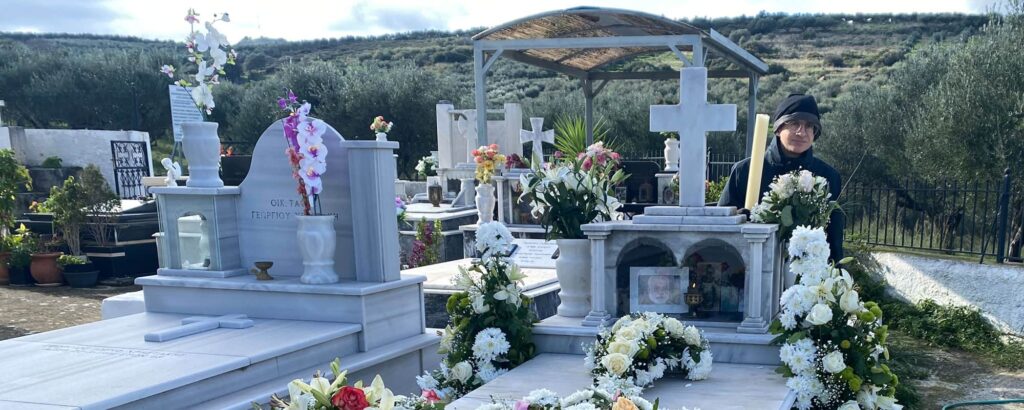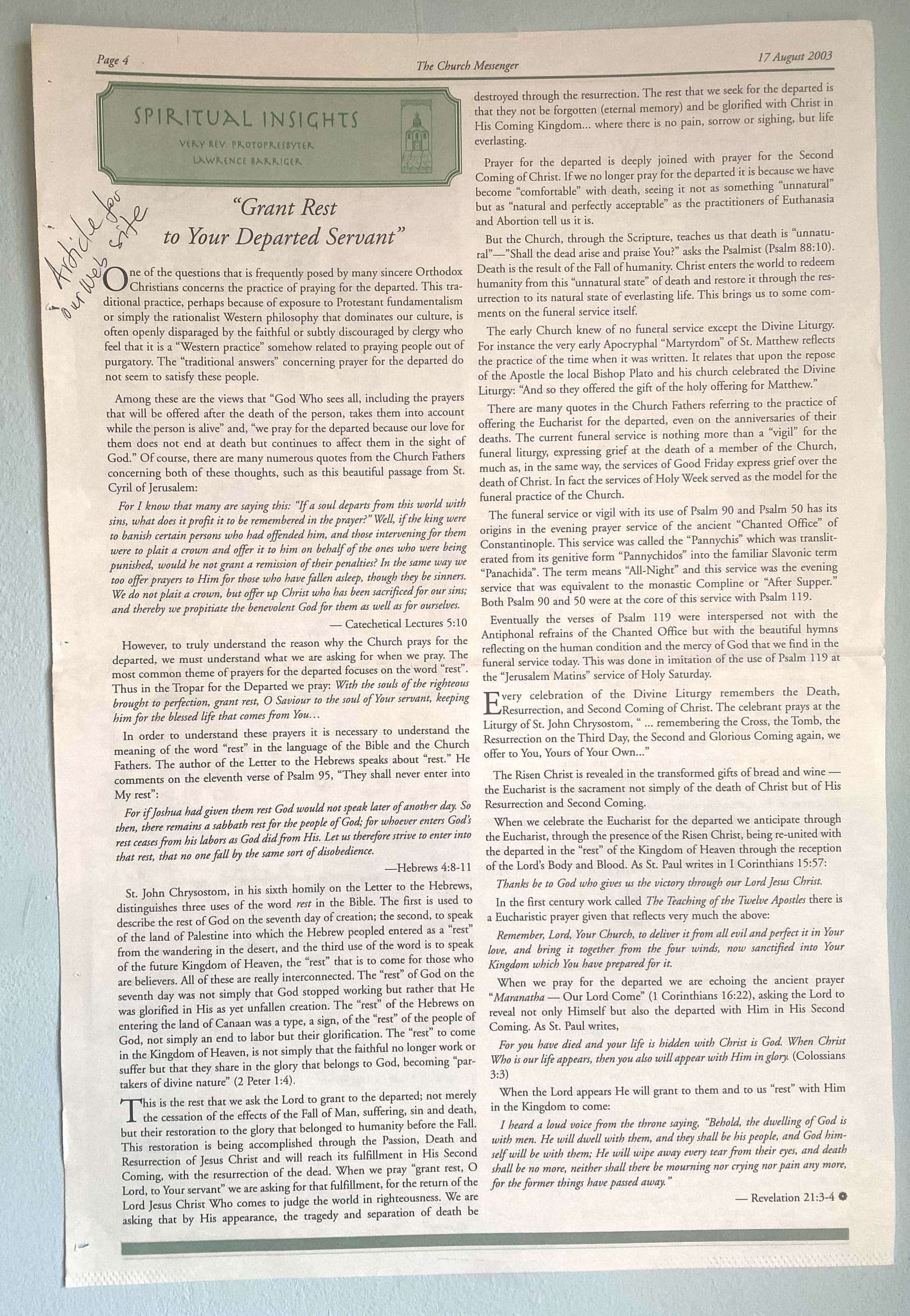
Grant Rest to Your Departed Servant
One of the questions that is frequently posed by many sincere Orthodox Christians concerns the practice of praying for the departed. This traditional practice, perhaps because of exposure to Protestant fundamentalism or simply the rationalist Western philosophy that dominates our culture, is often openly disparaged by the faithful or subtly discouraged by clergy who feel that it is a “Western practice” somehow related to praying people out of purgatory. The “traditional answers” concerning prayer for the departed do not seem to satisfy these people.
Among these are the views that “God Who sees all, including the prayers that will be offered after the death of the person, takes them into account while the person is alive” and, “we pray for the departed because our love for them does not end at death but continues to affect them in the sight of God.” Of course, there are many numerous quotes from the Church Fathers concerning both of these thoughts, such as this beautiful passage from St. Cyril of Jerusalem:
For I know that many are saying this: “If a soul departs from this world with sins, what does it profit it to be remembered in the prayer?” Well, if the king were to banish certain persons who had offended him, and those intervening for them were to plait a crown and offer it to him on behalf of the ones who were being punished, would he not grant a remission of their penalties? In the same way we too offer prayers to Him for those who have fallen asleep, though they be sinners. We do not plait a crown, but offer up Christ who has been sacrificed for our sins; and thereby we propitiate the benevolent God for them as well as for ourselves. – Catechetical Lectures 5:10
However, to truly understand the reason why the Church prays for the departed, we must understand what we are asking for when we pray. The most common theme of prayers for the departed focuses on the word “rest”.
Thus in the Troparion for the Departed we pray: With the souls of the righteous perfected [in faith], grant rest, O Savior to the soul of Your servant, keeping him for the blessed life that comes from You ...
In order to understand these prayers it is necessary to understand the meaning of the word “rest” in the language of the Bible and the Church Fathers. The author of the Letter to the Hebrews speaks about “rest.” He comments on the eleventh verse of Psalm 95, “They shall never enter into My rest”:
For if Joshua had given them rest God would not speak later of another day. So then, there remains a sabbath rest for the people of God; for whoever enters God’s rest ceases from his labors as God did from His. Let us therefore strive to enter into that rest, that no one foil by the same sort of disobedience. – Hebrews 4:8-11
St. John Chrysostom, in his sixth homily on the Letter to the Hebrews, distinguishes three uses of the word rest in the Bible. The first is used to describe the rest of God on the seventh day of creation; the second, to speak of the land of Palestine into which the Hebrew peopled entered as a “rest” from the wandering in the desert, and the third use of the word is to speak of the future Kingdom of Heaven, the “rest” that is to come for those who are believers. All of these are really interconnected. The “rest” of God on the seventh day was not simply that God stopped working, but rather that He was glorified in His as yet unfallen creation. The “rest” of the Hebrews on entering the land of Canaan was a type, a sign, of the “rest” of the people of God, not simply an end to labor but their glorification. The “rest” to come in the Kingdom of Heaven is not simply that the faithful no longer work or suffer, but that they share in the glory that belongs to God, becoming “partakers of divine nature” (2 Peter 1:4).
This is the rest that we ask the Lord to grant to the departed; not merely the cessation of the effects of the Fall of Man, suffering, sin and death, but their restoration to the glory that belonged to humanity before the Fall. This restoration is being accomplished through the Passion, Death and Resurrection of Jesus Christ and will reach its fulfilment in His Second Coming, with the resurrection of the dead. When we pray “grant rest, O Lord, to Your servant” we are asking for that fulfillment, for the return of the Lord Jesus Christ Who comes to judge the world in righteousness. We are asking that by His appearance, the tragedy and separation of death be destroyed through the resurrection. The rest that we seek for the departed is that they not be forgotten (eternal memory) and be glorified with Christ in His Coming Kingdom ... where there is no pain, sorrow or sighing, but life everlasting.
Prayer for the departed is deeply connected with prayer for the Second Coming of Christ. If we no longer pray for the departed it is because we have become “comfortable” with death, seeing it not as something “unnatural” but as “natural and perfectly acceptable” as the practitioners of euthanasia and abortion tell us it is.
But the Church, through the Scripture, teaches us that death is “unnatural” – “Shall the dead arise and praise You?” asks the Psalmist (Psalm 88:10). Death is the result of the Fall of humanity. Christ enters the world to redeem humanity from this “unnatural state” of death and restore it through the resurrection to its natural state of everlasting life. This brings us to some comments on the funeral service itself.
The early Church knew of no funeral service except the Divine Liturgy. For instance the very early Apocryphal “Martyrdom” of St. Matthew reflects the practice of the time when it was written. It relates that upon the repose of the Apostle, the local Bishop Plato and his church celebrated the Divine Liturgy: “And so they offered the gift of the holy offering for Matthew.”
There are many quotes in the Church Fathers referring to the practice of offering the Eucharist for the departed, even on the anniversaries of their deaths. The current funeral service is nothing more than a “vigil” for the funeral liturgy, expressing grief at the death of a member of the Church, much as, in the same way, the services of Good Friday express grief over the death of Christ. In fact the services of Holy Week served as the model for the funeral practice of the Church.
The funeral service or vigil with its use of Psalm 90 and Psalm 50 has its origins in the evening prayer service of the ancient “Chanted Office” of Constantinople. This service was called the “Pannychis” which was transliterated from its genitive form “Pannychidos” into me familiar Slavonic term “Panachida”. The term means “All-Night” and this service was the evening service that was equivalent to the monastic Compline or “After Supper.” Both Psalm 90 and 50 were at the core of this service with Psalm 119.
Eventually the verses of Psalm 119 were interspersed not with the Antiphonal refrains of the Chanted Office but with the beautiful hymns reflecting on the human condition and the mercy of God that we find in the funeral service today. This was done in imitation of the use of Psalm 119 at the “Jerusalem Matins” service of Holy Saturday.
Every celebration of the Divine Liturgy remembers the Death, Resurrection, and Second Coming of Christ. The celebrant prays at the Liturgy of St. John Chrysostom, “... remembering the Cross, the Tomb, the Resurrection on the third day, the Second and glorious Coming, we offer to You, Yours of Your Own...”
The Risen Christ is revealed in the transformed gifts of bread and wine – the Eucharist is the sacrament not simply of the death of Christ but of His Resurrection and Second Coming.
When we celebrate the Eucharist for the departed we anticipate, through the Eucharist, through the presence of the Risen Christ, being re-united with the departed in the “rest” of the Kingdom of Heaven through the reception of the Lord’s Body and Blood. As St. Paul writes in 1 Corinthians 15:57:
Thanks be to God who gives us the victory through our Lord Jesus Christ.
In the first century work called The Teaching of the Twelve Apostles there is a Eucharistic prayer given that reflects very much the above:
Remember, Lord, Your Church, to deliver it fom all evil and perfect it in Your love, and bring it together from the four winds, now sanctified into Your Kingdom which You have prepared for it.
When we pray for the departed we are echoing the ancient prayer “Maranatha – Our Lord Come” (1 Corinthians 16:22), asking the Lord to reveal not only Himself but also the departed with Him in His Second Coming. As St. Paul writes,
For you have died and your life is hidden with Christ is God. When Christ Who is our life appears, then you also will appear with Him in glory. –Colossians 3:3
When the Lord appears He will grant to them and to us “rest” with Him in the Kingdom to come:
I heard a loud voice from the throne saying, ‘Behold, the dwelling of God is with men. He will dwell with them, and they shall be His people, and God Himself will be with them; He will wipe away every tear from their eyes, and death shall be no more, neither shall there be mourning nor crying nor pain any more, for the former things have passed away.’ – Revelation 21:3-4


